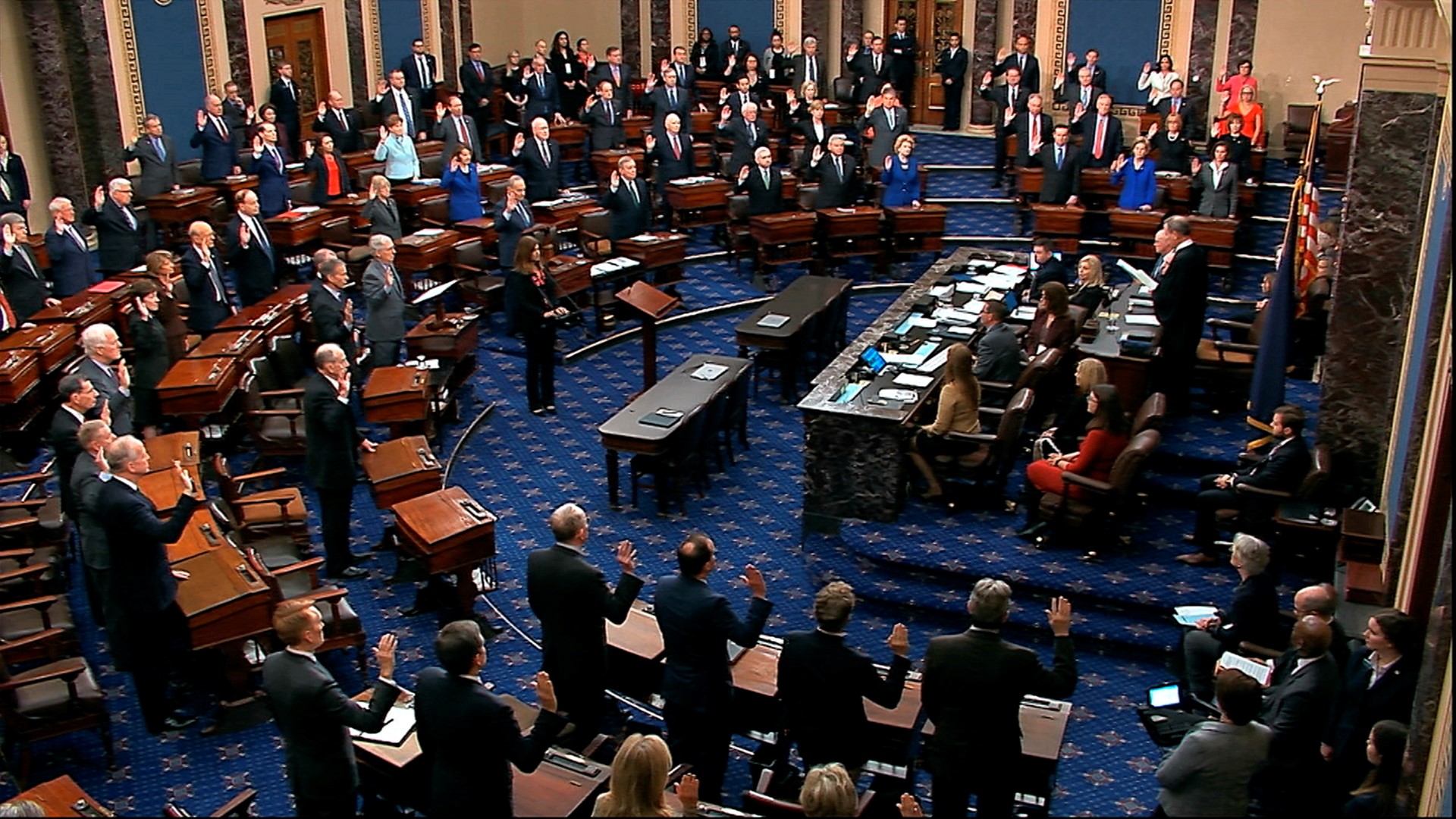After a nearly 13-hour marathon day that included votes on 11 different amendments, and some arguments by both legal teams that got personal, the Senate voted in favor of updated rules for the impeachment trial of President Donald Trump. The amended rules won't cram opening arguments into two 12-hour days for each team, but put in doubt whether witnesses will be called later.
The original rules proposed Tuesday by Senate Majority Leader Mitch McConnell would have given House managers and Trump's defense team 24 hours over two days each to make their opening arguments. That was changed to 24 hours over three days each.
The Senate will also hear arguments from lawyers on both sides before debating whether to seek witness testimony and documents. The original version of McConnell’s rules said the House couldn’t submit its evidence until the question of witnesses was resolved. McConnell made the change after hearing from moderate Republicans.
The session ended just before 2 a.m. Wednesday. The trial is set to resume at 1 p.m. Wednesday.
The most heated moment of the day came in the 12th hour as an amendment was presented to call former national security adviser John Bolton as a witness. Arguments by Rep. Jerry Nadler, D-NY, and White House Counsel Pat Cipollone became bitter, prompting an extraordinary admonishment of both sides by the normally reserved Chief Justice John Roberts.
“I think it is appropriate at this point for me to admonish both the House managers and the president’s counsel in equal terms to remember that they are addressing the world’s greatest deliberative body,” Roberts said, adding that the lawyers needed to "remember where they are."
The amendment to call Bolton was tabled by a strict party-line vote, 53-47 in favor of Republicans. In fact, every amendment but one went that way, including ones to subpoena Acting White House Counsel Mick Mulvaney, White House documents pertaining to Ukraine, and Defense Department documents related to withholding of aid to Ukraine.
The one outlier was a 52-48 vote against ensuring that there would be a vote later on additional witnesses. The one Republican to cross party lines there was Sen. Susan Collins, who has voiced she is open to hearing witnesses. Collins, who is facing a tough re-election campaign in November, is one of four Republicans seen as possibly crossing party lines on witnesses in the future.
Collins released a statement earlier in the day in which she said, "In keeping with the model used in President Clinton's trial, prior to hearing the case and the answers to Senators' questions, I will vote to table any attempts by either side to subpoena documents or witnesses before that state in the trial," adding, "That is one of the reasons why all 100 Senators agreed to this sequence during the Clinton trial."
As the day grew late, Senate Minority Leader Chuck Schumer pushed back an offer from McConnell to stack the votes and speed up the proceedings.
"We're making it hard for you to say no. We're making it hard for you to say I don't want to hear from these people, I don't want to see these documents," said Rep. Adam Schiff, leading the House managers. "We're making it hard. It's not our job to make it easy for you. It's our job to make it hard to deprive the American people of a fair trial, and that's why we're taking the time to do it."
RELATED: Sen. Collins among group of Republicans who fought to extend opening statements in impeachment trial
Trump's team did not dispute what the president did when he called Ukraine and asked for a “favor,” which was to announce an investigation into Joe Biden as the U.S. withheld vital military aid which had been approved by Congress. The lawyers said there was nothing wrong with it.
“Absolutely no case,” Cipollone said.
Schiff, chair of the House Intelligence Committee, began the prosecution's case by saying the founding fathers created the option of impeachment for the purpose of when a president chooses his or her own personal interests over those of the country.
"... that undermines our national security, and that invites foreign interference in the democratic process of an election," Schiff said.
Democrats also pointed to a ruling last week by the nonpartisan General Accountability Office report that found the White House violated federal law by stalling money to Ukraine that had been approved by Congress.
This is the third impeachment trial ever for a U.S. president. No president has ever been removed from office through impeachment. If the party-line votes through the day were any indication, it's unlikely Democrats will get the 67 votes needed to convict and remove Trump.

